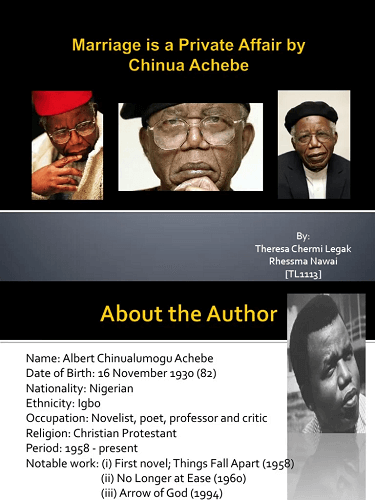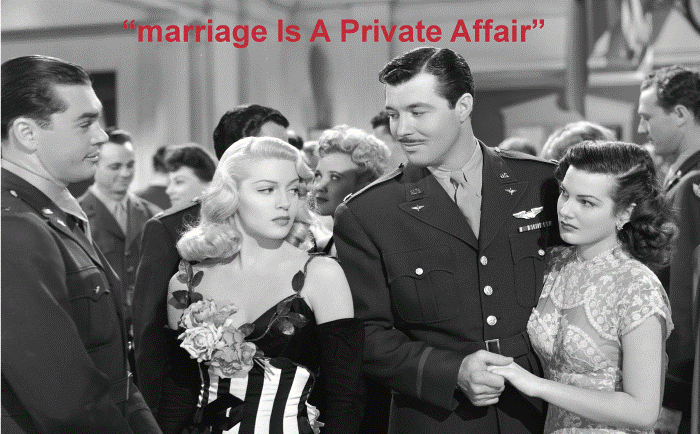Marriage is a Private Affair SummaryIntroductionChinua Achebe published "Marriage is a Private Thing" Eight years before Nigeria's separation from the British Empire in 1952. As a result, when reading the short tale, remember that Achebe was particularly interested in the developing independence movements in Nigeria and other adjacent African nations. Six years after he published "Marriage is a Private Affair," Ghana became the first African country to attain independence, but Nigeria quickly followed. Several cultural and political difficulties that Nigeria will later encounter are addressed in the story. Ethnic groups influenced Nigeria's post-independence development, the impact of Christianity, and the conflict between a modern, urban Nigeria and a rural, traditional Nigeria, among other factors. Ethnic and political conflicts eventually encouraged the Biafran War (1967-1970), in which Nigeria's Ibo people attempted to declare a separate state. It is only one illustration of how Achebe's issues significantly impact the future of the country he envisions and the small village he writes about. 
The Plot of the Story"Marriage is a Private Affair" by Chinua Achebe depicts two young people falling in love and choosing to get married despite the challenges that will confront them as a married couple. For several years, the boy's father vehemently opposes the relationship, yet, in the end, the harsh father-in-law is compelled to submit to the influence of the very love he opposed regarding his son's relationship with the woman he loved. When he finds out that his grandchildren want to meet him, he must choose between compromising his firm opposition to visiting his son and daughter-in-law and his opposing emotions. The narrative's message is clear: marriage is a private matter, and love in the family is essential in strengthening relationships among all members. Character SummaryNene AtangNene is a young primary school teacher from Lagos, Nigeria. She engaged and eventually married Nnaemeka, giving birth to two sons. Despite her Christian faith, Nene is not an Ibo like Nnaemeka, which causes Nnaemeka's father to reject the couple's relationship. Nene finds Okeke's prejudice amusing because she is used to living in urban Lagos. Despite his many years of arrogant rejection, Nene still hopes that Okeke will accept their family. She eventually appealed to his emotions by writing to let him know that his grandkids wanted to visit their grandfather. NnaemekaNene's fianc� and Okeke's son, Nnaemeka, is a young Ibo man and the story's main character. He is highly careful and values his father's opinion of him considerably. He waits to tell Okeke about his engagement to avoid upsetting his father because Nene is not an Ibo. It generates friction between him and Nene, and he eventually agrees to leave Lagos and fly to his remote home to discuss his choice to marry Nene with his father. Despite his father's complete disapproval and subsequent separation from him, Nnaemeka hopes his father will accept Nene and his intention to marry her. Nnaemeka ignores that by choosing his marriage and marrying a non-Ibo, he is the first individual in the community to break custom, making his choice even more unexpected and disrespectful to Okeke and the rest of the village. Encouraged by Nene's eventual acceptance among her Ibo peers in Lagos, Nnaemeka keeps writing and sending pictures to his father about their married life there. Despite his father's disapproval, Nnaemeka never loses faith that Okeke will embrace their marriage and join their growing family. He does not regret marrying Nene. OkekeNnaemeka's father is Okeke. He lives in a tiny community and believes in traditional, conservative values. Okeke believes things should be done the same way they have always been; old customs must be followed, implying he cannot consent to his son marrying a non-Ibo lady, as the Ibos in his community never do this. They never marry outside of their group. Okeke is a stubborn guy who will not change his mind, even if it means separating himself from his son, whom he adores. On the other hand, Okeke is a devoted Christian who feels that religion is on his side. He disapproves of his son's fianc�e's profession as a teacher. He finds religious support in The Bible for his view that women should not teach. He is passionate about the matter and makes his son aware of his feelings. He and the other men in the neighborhood do not think a girl's education is all that important. She should learn what she needs to know to be a decent wife. Even when his child is involved, Okeke is fixed in his ways and would not explore new concepts. He goes to great efforts to express his displeasure, refusing to speak to his son and rejecting his son's bride. Although he feels he is correct, and Nnaemeka describes his father as a good-natured man, his behavior appears illogical and unkind. He eventually softens his attitude and is overcome with guilt for his past behavior due to Nene's desire to allow his grandkids to see him. MadubogwuMadubogwu is a resident of Okeke's rural community. He is a sensible individual who enjoys finding straightforward answers to difficulties. He is the one who first advises Okeke to consult a native doctor to convince Nnaemeka to review his engagement with Nene. Although Okeke finally rejects his offer, Madubogwu shows that the question of marriage includes much more individuals than Nnaemeka and Nene. It concerns Okeke and others in the village who consider marriage communal rather than private. Ugoye NwekeAlthough Ugoye Nweke is not mentioned by name in the story, she is the young lady that Okeke and his neighbor decided would make a good wife for Nnaemeka. Okeke believes Ugoye has received enough knowledge to make her a suitable wife but has yet to form her own beliefs. 
Summary"Marriage is a Private Affair" opens with a conversation between a couple living in Lagos, set in Nigeria in the 1950s. Nene believes that Nnaemeka should let his father know about their engagement in writing. Nnaemeka promises to tell his father in person, although he does not expect him to be happy with their relationship, given that Nene is not an Ibo. Moreover, the engagement was not agreed upon, as is usual in Nnaemeka's father's community. Nnaemeka walks away from Nene's house, thinking about the letter his father, Okeke, had written him. The letter explains Okeke's aspirations for Nnaemeka to marry Ugoye, a girl Nnaemeka has been familiar with since his adolescence due to her propensity for beating up men. Okeke asserts that she would make a suitable wife for a Christian. Weeks later, when Nnaemeka arrives home, he informs his father that he cannot wed Ugoye since he does not love her, which is fine for his father. Nnaemeka makes unsuccessful attempts to explain how marriage has changed, but Okeke insists that nothing has changed. Nnaemeka apologizes to Okeke and tells him that he is engaged to Nene. Okeke stays silent for the night instead of bursting into anger, as Nnaemeka expected. Okeke screams that their engagement is Satan's plan and swears that he will wreck it and never meet Nene before Nnaemeka leaves. Okeke needs to communicate more with his son. Villagers feel sorry for the older man and suggest that he hire an herbalist to make Amalile, a medicine that women use to keep their partners faithful. Okeke dismisses the notion as superstition. The couple's wedding photos are returned in a letter from Nnaemeka's father six months later, but only after he has torn them in half to divide the couple. As Nene notices the ruined photo, she starts to cry. Nnaemeka told her that Okeke would change his mind, but Okeke had been avoiding his son and daughter-in-law for years. Eventually, news of Nene and Nnaemeka's blissful wedding reaches Okeke's neighborhood. Nobody shares the information, though, because Okeke has a reputation for bursting if his son's name is spoken. Okeke is nearly killed by the pressure of toughening his heart towards his son, yet he continues. One day, Okeke receives a letter from Nene informing him that his grandchildren want to see him. She promises to stay in Lagos. Okeke's rigid attitude crumbles after learning about his grandkids. Simultaneously, the rain hits, smashing his roof with huge, stinging raindrops. Okeke imagines his grandchildren standing in the rain, cut off from his home. At the end of the Story, Okeke has trouble sleeping that night. He is sorrowful for leaving his family and believes he will not live long enough to apologize. AnalysisThe opening of Nene and Nnaemeka's chat pointed to the differences between urban life in Lagos and rural life in Nnaemeka's native town. While Nene believes in getting the "news" out as soon as possible, despite Nnaemeka's father's distance from them, Nnaemeka feels the news should be expressed personally. In other words, it should be a private exchange between father and son.
Next TopicThe Necklace Summary Class 10 English
|
 For Videos Join Our Youtube Channel: Join Now
For Videos Join Our Youtube Channel: Join Now
Feedback
- Send your Feedback to [email protected]
Help Others, Please Share









